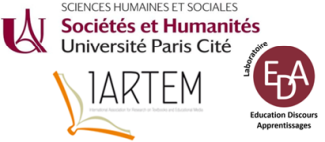Textbooks are the single pedagogical resource consistently distributed to Brazilian teachers and students. Every four years, the Brazilian textbook distribution program (PNLD) can be changed, introducing innovations that require an evaluation of their relevance and impact in the classroom. In the current cycle of Brazilian secondary school education, one of the innovations has been the interdisciplinary project textbooks. Organized into four areas – Languages, Mathematics, Natural Sciences, and Humanities – each textbook features six projects contextualized around different themes. The topic of climate change, an urgent issue of our time and therefore necessary for discussion in schools, can manifest more explicitly, such as in a discussion on global warming, or less explicitly when working with themes like water, sustainability, and energy. In this context, understanding which themes are present in textbooks, which are of interest to teachers, and whether environmental education is part of these themes constitutes a relevant research problem for the educational field. Two research questions then arise: Is there alignment between the themes preferred by teachers and the selection of themes in textbooks? Is climate change present in textbooks and is it part of teachers' interests?
To answer these questions, this research first analyzed the themes present in the 18 Language textbooks, 14 Mathematics textbooks, 13 Natural Sciences textbooks, and 19 Humanities textbooks approved by the PNLD. These are the textbooks available for teachers to choose from and will be distributed to all Brazilian secondary school students. Subsequently, a survey was conducted in 2022 and 2023, where teachers were asked about their interest in a pre-supplied list of themes, including all the themes present in textbooks, with the possibility for respondents to add new ones. The survey was answered by a sample of 2047 teachers, generating the ranking of various themes on a scale of 0% to 100% interest for each of the four areas.
Diversity (89.6%), Narratives and languages (88.6%), and Media and communication (88.2%) were the preferred themes in the Language area. Afro-Brazilian and indigenous history and culture (89.3%), Diversity (88.5%), and Ethics and politics (88.3%) in the Humanities area. Water (91.4%), Environment and sustainability (90.8%), and Health and the human body (90.5%) in the Natural Sciences area. Personal finance (88.1%), Art and mathematics (85.2%), and Inclusion (84.5%) in the Mathematics area.
These themes preferred by teachers are not the most present in textbooks approved by the PNLD, indicating a need for adjustment of themes for future program editions. In the four areas, only one of the most interesting themes for teachers is frequently present in interdisciplinary project books: Diversity in Languages (present in 11.0% of projects) and Humanities (10.5% of projects); Environment and sustainability in Natural Sciences (13.9% of projects); and Personal finance in Mathematics (8.8% of projects).
About the presence of themes related to climate change in textbooks and in teachers' preferences, in a broader perspective of environmental education, where discussions on water resources, energy resources, the environment, sustainability, and consumption habits can be understood as related to climate change, teachers' interest is relatively high, although not sufficient to place the subject among the top three most interesting themes: 87.6% interest among Language teachers, 88.2% in Humanities, and 83.5% in Mathematics. The exception is the Natural Sciences area, which, with themes like water, environment, and sustainability already in the top 3, has an overall interest of 90.9% in subjects related to climate change.
In this broad sense, the topic of climate change is also relatively present in approved books: 18.1% of projects in Natural Sciences; 12.1% of projects in Mathematics, and 8.9% of projects in Humanities. The exception is only the Languages area, with projects involving only 2.4% of projects related to climate change.
Therefore, there is a scenario that requires adjustments to the PNLD for the themes present in textbooks to align more with teachers' interests and, especially in the case of Languages, a greater demand for environmental education, particularly concerning climate change, to be included.

 PDF version
PDF version
